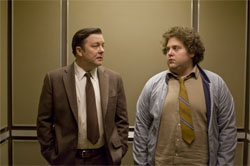I lie a lot. I don’t think I lie too much (and of course I never lie to you, devoted readers), but I do lie enough to get by. I tell little white lies to cruise through conversations and I embellish stories at parties to sound more interesting. I occasionally lie to cover my own ass. Sometimes I lie to myself just to stay sane. In day-to-day life, we all lie. What would happen if this simply weren’t possible? And how would things change once someone finally “discovers” how to lie? In The Invention of Lying, writer, director and star Ricky Gervais considers these questions. But though the film touches on some pretty heavy topics, it ultimately shies away in favor of unimaginative silliness.
It’s not that Lying is horrible movie—Gervais, creator and star of the original British version of The Office, has proven himself a solid comedy writer, and at times during this film his talent shines through. The dialogue is witty, and Lying’s few forays into social commentary are spot on. My main grievance is with the film’s premise. Yes, we are told from the start that this is a world without lies or fiction, and I accept that. What we are not told is that this is also a world without subtlety, modesty, or self-censorship. I don’t care if there is no such thing as a lie, no one will ever answer the door for a blind date by announcing unsolicited, “You’re early. I was just masturbating.” This is also a world without sympathy or empathy; it is a world where strangers on the street will tell you how ugly you are and co-workers will talk like you’re not in the room. There’s a limit to my suspension of disbelief.
 By stretching the premise so thin, The Invention of Lying creates a world without texture. This bizzaro-Earth creates a funhouse mirror view of our own society, but ignores the big questions in exchange for cheap jokes. What would happen to the advertising industry if it could only be truthful? Is true, honest love possible? These issues are brushed off with quick gags that crumble under a bit of scrutiny.
By stretching the premise so thin, The Invention of Lying creates a world without texture. This bizzaro-Earth creates a funhouse mirror view of our own society, but ignores the big questions in exchange for cheap jokes. What would happen to the advertising industry if it could only be truthful? Is true, honest love possible? These issues are brushed off with quick gags that crumble under a bit of scrutiny.
To its credit, The Invention of Lying does a solid job touching on religion. Without giving too much away, the movie begins without any concept of God or the afterlife and ends with a rather ill-defined one involving mansions and a man in the sky, all thanks to our loveable lying hero. Unfortunately, despite having populated its world with one-dimensional, impulsive, credulous characters, the film doesn’t take the next (absurd yet logical) step—there are no mass suicides to speed the population to their sky-mansions. Maybe I’m just dark, but I like films that have the guts to follow through.
By no means does Gervais deserve to be taken out to the woodshed for The Invention of Lying. In the end, he made a cute, forgettable film featuring a cavalcade of celebrity cameos (keep your eyes open for Phillip Seymour Hoffman and Edward Norton). The movie is innocuous and silly and will probably make a lot of money. It seems a shame, though, to create a world with so much potential and then never dive in. But hey, would you prefer I lied and said I liked it?




